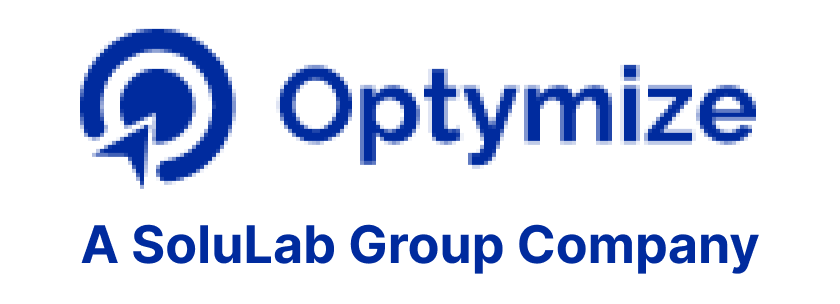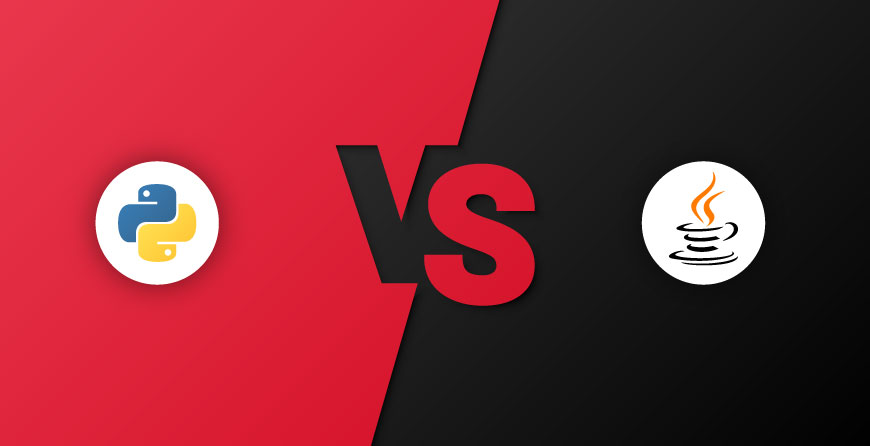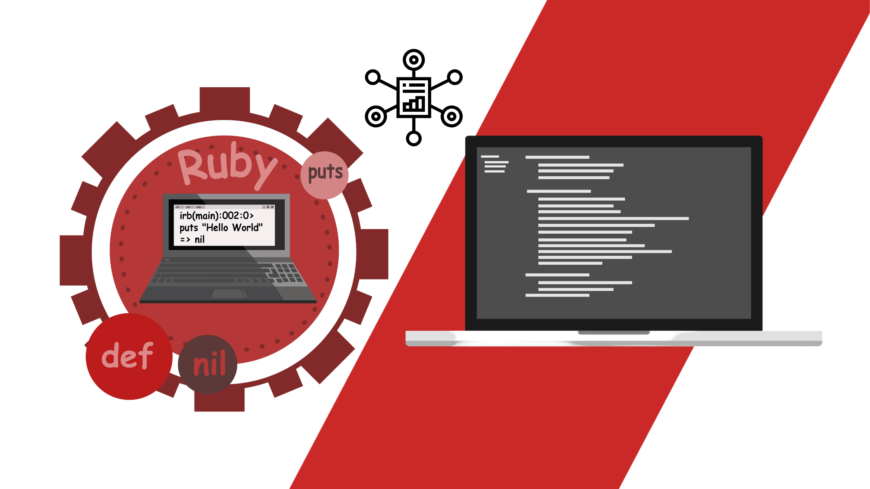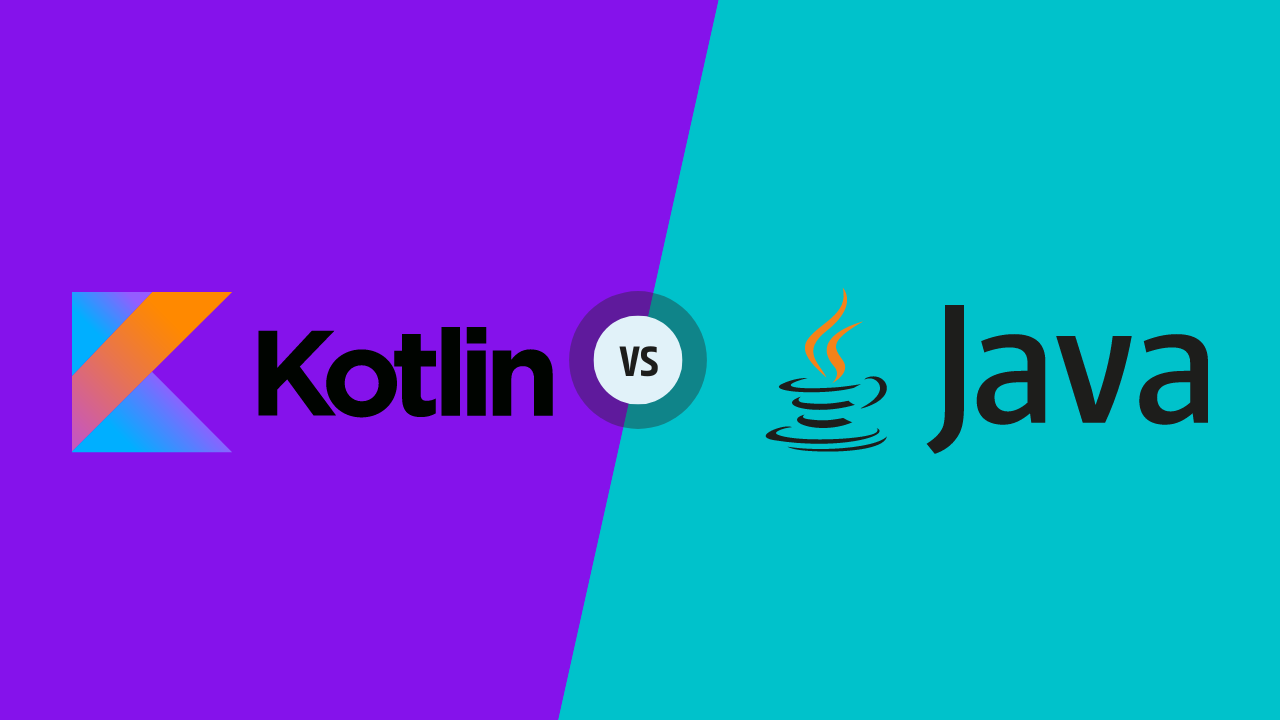If you compare Python vs Java, you will find that both have unique features that help different sections of the software development industry.
You can develop Web Apps and Software with Python, build AI/ML solutions, Develop Games, Blockchain solutions and much more. Likewise, you can build Web and Mobile Apps with Java, build IoT and Cloud Applications, develop Enterprise applications and many more.
Both Java and Python are general-purpose object-oriented and extensively utilised in developing various types of internet-based apps. If the comparison of Python vs Java is about who came first, then Java will win the race. Python was created and made publicly available in roughly 2000, whereas Java was launched earlier.
To judge the comparison of Python vs Java, we will have to look at several factors such as speed, scalability, machine code, security, simplicity, syntax, and their usage around different technologies.
Python vs Java: Definition
What is Python?
Python is a general-purpose programming language with dynamic typing. Python’s early development took place at a Dutch research institute. Its syntax is legible and simple. The syntax was inspired by Algol68, Pascal, and ABC.
Its built-in data structures with dynamic typing, binding and lower maintenance cost make Python a good fit for Rapid Application Development.
One of the advantages of Python is that the interpreter and resource library are both freely available on the internet.
What is Java?
Java is a general-purpose, statically typed, object-oriented, and concurrent programming language. With the aid of the Java Virtual Machine, Java was designed to be a WORA (write once, run everywhere) language, able to execute on any platform and with as little dependencies as feasible (JVM).
Python vs Java Differences
Python and Java are leading programming languages in the tech industry. Some technical comparisons will clarify how they vary. The following are differences between Java and Python are listed below.
Python vs Java Performance
Python is an interpreted language that focuses more on simplicity and readability. But it has slower performance than Java because of its interpreted nature and dynamic typing.
Java is a compiled language. It focuses more on performance and scalability. It is faster than Python due to its static typing and just-in-time (JIT) compilation.
The differences between Python and Java can be rather considerable at times. In comparison to Python, a simple binary tree test can execute 10 times more quicker in Java.
Python vs Java Syntax
Python focuses on simple and more concise syntax compared to Java. Python uses fewer lines of code to accomplish the same task as compared to Java. These make Python more user-friendly and straightforward to read.
Python uses indentation to denote code blocks while Java uses braces. Python follows dynamic typing but Java has a static typing system. Python supports functional programming paradigms while Java follows an object-oriented programming style.
Code Readability
Python strongly focuses on code readability. It has a simpler and more concise syntax compared to Java. It uses indentation to denote code blocks to improve code readability.
Python also supports English-like syntax and naming conventions. It gets easier for developers to understand code. Java has a more complex syntax with more verbose code and requires more lines of code to accomplish the same task.
Python vs Java Popularity
According to the Stack Overflow Developer Survey 2022, 43.51% of professional developers use Python while 33.4% of professional developers use Java. According to the survey, Python ranks 4th while Java ranks 6th.
Python’s popularity is due to its ease of use, versatility, and huge applications in data science and machine learning. Java’s popularity is due to its use in enterprise-level applications.
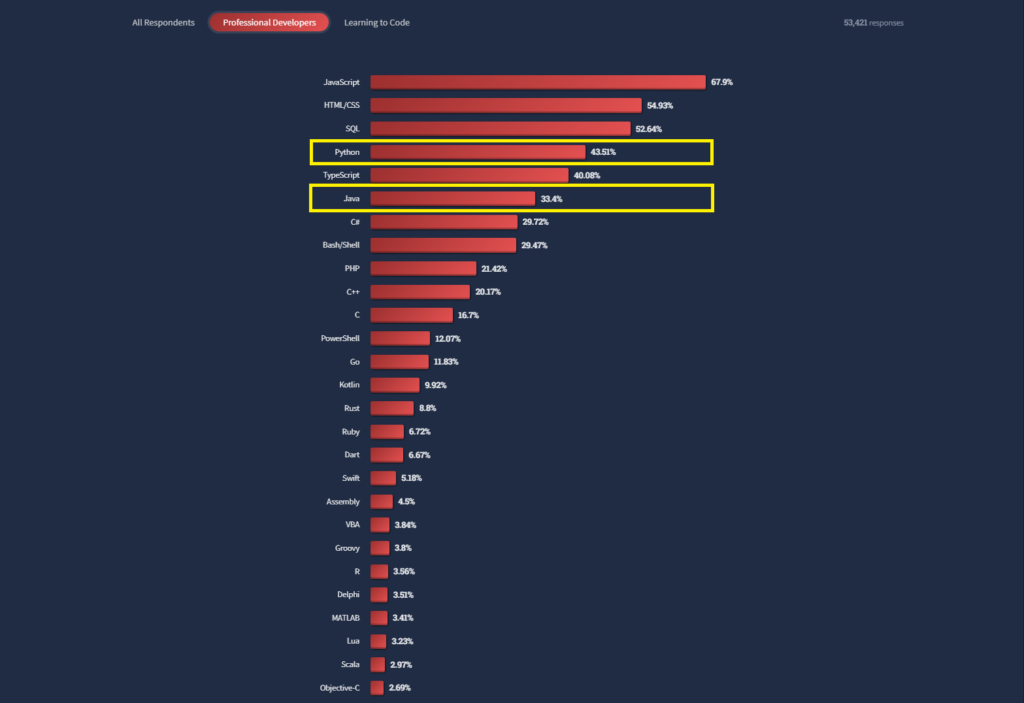
Python vs Java Jobs
Python is popular in machine learning, data science, web development, and scripting. Python jobs are available in tech startups, scientific research, and education sectors.
Java is widely used for enterprise applications, Android app development, and building large-scale systems. Job opportunities for Java are abundant in the finance, healthcare, and government sectors.
Both Java and Python have a wide range of job opportunities but in different industries.
Some Popular Python Job Titles Are –
- > Data Analyst
- > Data Scientist
- > Machine Learning Engineer
- > Software Developer
- > Web Developer
- > AI Engineer.
Some Popular Java Job Titles Are –
- > Software Engineer
- > Application Developer
- > Full-Stack Developer
- > Backend Developer
- > Mobile Developer
- > DevOps Engineer
These are just a few examples, as the job titles for both languages can vary depending on the industry, company, and specific job responsibilities.
Python vs Java Usage in Machine Learning
You can use Python and Java in machine learning but Python is the more popular choice. Its ease of use and availability of numerous open-source libraries and frameworks such as TensorFlow, Keras, PyTorch, and Scikit-learn makes it easy for developers. Python’s dynamic typing, simple syntax, and strong support for functional programming make it an ideal choice for machine learning.
Java is less popular in the machine learning community. Java is used for developing enterprise-level applications with robust features.

According to our research, Python developers in the USA earn roughly $120,000. Python Developers from other locations earn comparatively less. Read our Detailed Report on Python Salary based on location and experience.
Advantages of Python
- > Python has simple syntax compared to Java, C, and C++.
- > Used in Machine Learning, AI, data analysis, and visualization.
- > Extensive libraries and tools for developers.
- > Cross-compatible and auto-installed shell.
- > Easy to write, debug, and maintain compared to other languages.
- > Portable and runs on various operating systems and platforms.
- > Prebuilt libraries make development tasks easier.
- > Makes complex programming simpler with garbage collection and memory handling.
- > Interactive shell for testing before implementation.
- > Offers database interfaces for major DBMS systems.
- > Supports imperative and functional programming.
- > Python is popular for IoT.
Advantages of Java
- > Java has detailed documentation available.
- > A large pool of skilled developers are available.
- > Huge array of 3rd party libraries.
- > Forms standard programs and reusable code.
- > Multi-threaded environment for simultaneous tasks.
- > Excellent performance.
- > Easy-to-navigate libraries.
Difference Between Java and Python
| Technology | Python | Java |
|---|---|---|
| Popularity | Very popular | Very popular |
| Syntax | Easy to learn and use | Complex includes a learning curve |
| Performance | Slower than Java in various implementations | Relatively very fast |
| Cross-Platform | Yes | Yes, thanks to the JVM |
| Backend Frameworks | Django, Flask | Spring, Blade |
| Machine Learning Libraries | Tensorflow, Pytorch | |
| Game Development Engines | Cocos, Panda3d | JMonkeyEngine |
| Learning curve | Easy to learn | Difficult to learn Weka, Mallet, Deeplearning4j, MOA |
| Typing | Dynamically-typed | Statically-typed |
| Best for | Artificial Intelligence, Data Science and Machine Learning | Enterprise, Embedded and Cross-platform application |
| Program Example | print("Hello World") | public class Simple { public static void main(String args[]) { System.out.println("Hello World"); } } |
Java or Python Which Is Better For Future
Java and Python are both extremely strong and adaptable programming languages. They both have advantages and disadvantages, so it all depends on how you want to utilize them. Both are general-purpose programming languages that may be used to construct programmes for a variety of purposes, including games, web applications, scientific simulations, and more.
Python vs Java: FAQ
Q: Is Java faster than Python?
A: Yes, Java is generally faster than Python due to its compilation process, which allows for better performance in large-scale applications.
Q: Is Python easier than Java?
A: Yes, Python has simpler syntax and is easier to learn compared to Java, which has a steeper learning curve and requires more attention to detail.
Q: Python or Java, which is best?
A: Choosing the best will depend on how you want to use them. Python is better for data science applications, machine learning models, scripting and many more. Java is better for enterprise applications and large-scale systems.
Q: Should I learn both Java and Python?
A: In this competitive market, acquiring knowledge of multiple programming languages is better. Learning both Python and Java will broaden your skill set and make you more versatile as a developer.
Q: What is easier to learn, Java or Python?
A: Python is very easy to learn due to its simpler syntax and easy-to-use libraries than Java.
Q: Java vs Python for mobile app development?
A: Java is the primary language for developing Android applications but Python is not.
Q: Python or Java for app development?
A: It depends on what kind of app you want to develop. If you are developing enterprise-level applications, Java is good. But if you are building machine learning modules or data science applications then Python is better.
